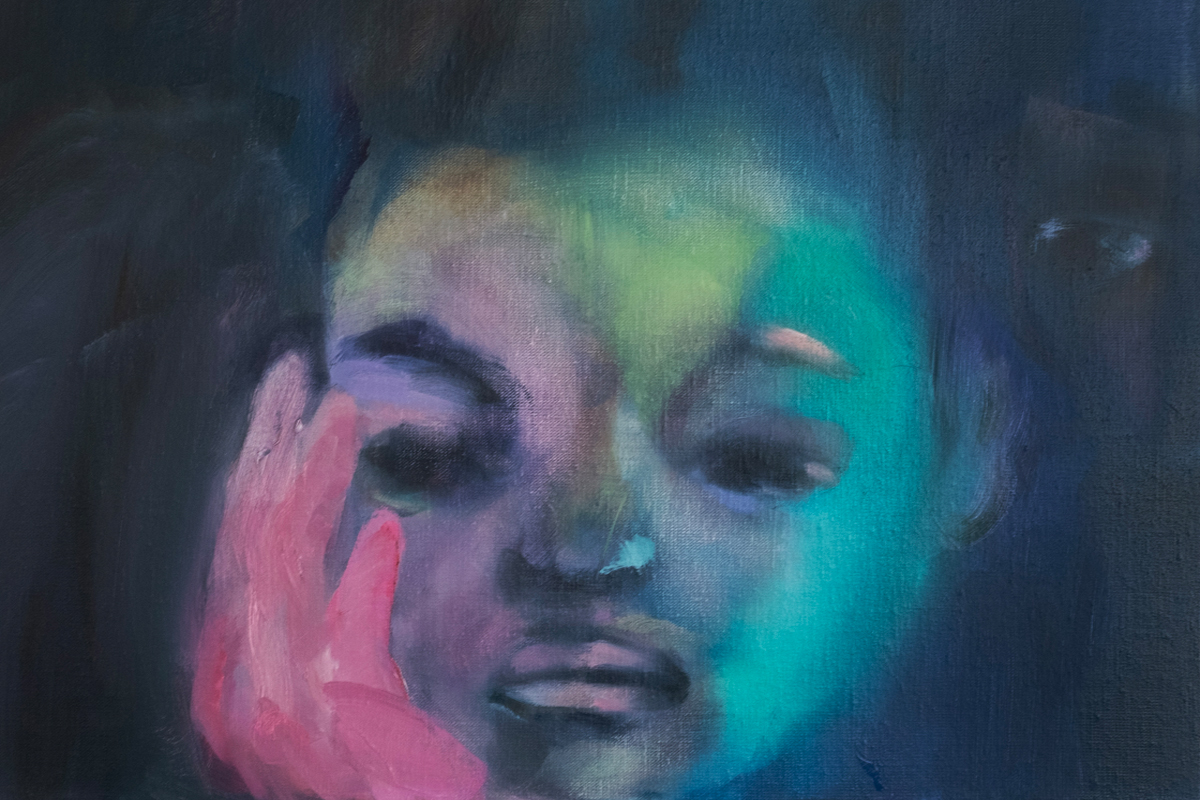
The skin I don’t have
Tatiana Gorgievski's paintings convey an energy of porosity. Sharpness and blurriness, cool and warm colours pulsate across the canvas tomake the bodies appear and disappear. The latter are always caught between radical solitude and a fusion that consumes them: they want to be together but cannot, seeking both to please and to flee. The artist works over a long period of time, through flashes of inspiration and periods of latency, superimposing thin layers of paint until a figure emerges, clinging to the canvas in extremis with a splash of bright colour: a red hand in ‘Mother and Son’ and ‘Lunatum’, a shiny eyelid in ‘No Guide No Shelter’, or a vermilion mouth in ‘Trying to be a Woman’. These various symptoms, which we see in the ethereal space of the painting, reflect an intensity of emotion that is extreme, both desirable and unbearable: the swollen arm turns red, under the effect of pleasure or a wound that is coagulating.
What painting allows is to deposit layers in order to cover oneself with them in turn, like a veil or a cloak. Only paint can also melt and confuse bodies: it is amniotic and re-enacts the silent exchange of life in plasmatic space. The figures seem to be swallowed up, drowned or engulfed by the paint according to different dynamics that can almost be read through the distinction between absorption and engulfment that Diderot compares to the elements of water and fire: while absorption consumes and destroys, engulfment "envelops, carries away and makes everything disappear at once: thus fire absorbs, so to speak, but water engulfs" (Diderot, Encyclopédie, 1751-1771).
In a 1966 radio lecture on the ‘Utopian Body’, Michel Foucault, after emphasising that our body, this place to which we are irrevocably bound, follows us wherever we go, shows that the utopias invented by humans – those of fairies, the dead, the soul – serve to erase this weight of the body, to transfigure it, or to make it disappear. Yet it is in the act of love that the body is truly brought back to itself, ceases to be dispersed and ghostly in order to calm down and anchor itself in the present: "Perhaps we should also say that making love is feeling your body close in on itself, finally existing outside of any utopia, with all its density, in the hands of another. Under the other's fingers running over you, all the invisible parts of your body begin to exist; against the other's lips, yours become sensitive; before their half-closed eyes, your face acquires a certainty; there is finally a gaze to see your closed eyelids."
Tatiana Gorgievski's anonymous figures, without gender or hierarchy, generally seem encased in skin that is either too loose or too tight for them to feel comfortable. In the void – which is not delimited by any walls or horizons – the presence of these beings cannot escape the gaze, just as no being can escape itself. "What appears in shame is precisely the fact of being riveted to oneself, the radical impossibility of fleeing from oneself to hide from oneself, the irredeemable presence of the self to oneself. Nudity is shameful when it is the revelation of our being, of its ultimate intimacy," writes Emmanuel Levinas in De l'évasion, 1982. If they radiate from within or are pierced by the translucent organs of others, it is because these beings are no longer physically embodied in an individuality and are entirely open to their surroundings. It is as if they had been ‘skinned’, like flayed beings or, even more so, like a-dermal beings, without a membrane separating them from the world. Their permeable surface confuses the sensors that enable them to perceive what is outside them. Uncovering themselves naked, they know that the gaze of others can rest upon them, to caress or suffocate them, giving them the fleeting feeling that they have a body and that they are there. Everything seems to play out at the level of this skinless envelope that dooms relationships to failure: we can only approach or distance ourselves from someone who is separate from us.
Elora Weill-Engerer

